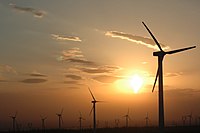
Photo from wikipedia
The technological promise of soft devices-wearable electronics, implantables, soft robotics, sensors-has accelerated the demand for deformable energy sources. Devices that can convert mechanical energy to electrical energy can enable self-powered,… Click to show full abstract
The technological promise of soft devices-wearable electronics, implantables, soft robotics, sensors-has accelerated the demand for deformable energy sources. Devices that can convert mechanical energy to electrical energy can enable self-powered, tetherless, and sustainable devices. This work presents a completely soft and stretchable (>400% strain) energy harvester based on variable-area electrical-double-layer (EDL) capacitors (≈40 µF cm-2 ). Mechanically varying the EDL area, and thus the capacitance, disrupts equilibrium and generates a driving force for charge movement through an external circuit. Prior EDL capacitors varied the contact area by depressing water droplets between rigid electrodes. In contrast, here, the harvester consists of liquid-metal electrodes encased in a hydrogel. Deforming the device by ≈25% strain generates a power density ≈0.5 mW m-2 . This unconventional approach is attractive because: (1) it does not need an external voltage supply to provide charge; (2) the electrodes themselves deform; and (3) it can work under various modes of deformation such as pressing, stretching, bending, and twisting. The unique ability of the harvester to operate underwater shows promising applications in wearables that contact sweat, underwater sensing, and blue energy harvesting.
Journal Title: Advanced materials
Year Published: 2021
Link to full text (if available)
Share on Social Media: Sign Up to like & get
recommendations!